64 Cores of Rendering Madness: The AMD Threadripper Pro 3995WX Review
by Dr. Ian Cutress on February 9, 2021 9:00 AM EST- Posted in
- CPUs
- AMD
- Lenovo
- ThinkStation
- Threadripper Pro
- WRX80
- 3995WX
CPU Tests: Encoding
One of the interesting elements on modern processors is encoding performance. This covers two main areas: encryption/decryption for secure data transfer, and video transcoding from one video format to another.
In the encrypt/decrypt scenario, how data is transferred and by what mechanism is pertinent to on-the-fly encryption of sensitive data - a process by which more modern devices are leaning to for software security.
Video transcoding as a tool to adjust the quality, file size and resolution of a video file has boomed in recent years, such as providing the optimum video for devices before consumption, or for game streamers who are wanting to upload the output from their video camera in real-time. As we move into live 3D video, this task will only get more strenuous, and it turns out that the performance of certain algorithms is a function of the input/output of the content.
HandBrake 1.32: Link
Video transcoding (both encode and decode) is a hot topic in performance metrics as more and more content is being created. First consideration is the standard in which the video is encoded, which can be lossless or lossy, trade performance for file-size, trade quality for file-size, or all of the above can increase encoding rates to help accelerate decoding rates. Alongside Google's favorite codecs, VP9 and AV1, there are others that are prominent: H264, the older codec, is practically everywhere and is designed to be optimized for 1080p video, and HEVC (or H.265) that is aimed to provide the same quality as H264 but at a lower file-size (or better quality for the same size). HEVC is important as 4K is streamed over the air, meaning less bits need to be transferred for the same quality content. There are other codecs coming to market designed for specific use cases all the time.
Handbrake is a favored tool for transcoding, with the later versions using copious amounts of newer APIs to take advantage of co-processors, like GPUs. It is available on Windows via an interface or can be accessed through the command-line, with the latter making our testing easier, with a redirection operator for the console output.
We take the compiled version of this 16-minute YouTube video about Russian CPUs at 1080p30 h264 and convert into three different files: (1) 480p30 ‘Discord’, (2) 720p30 ‘YouTube’, and (3) 4K60 HEVC.
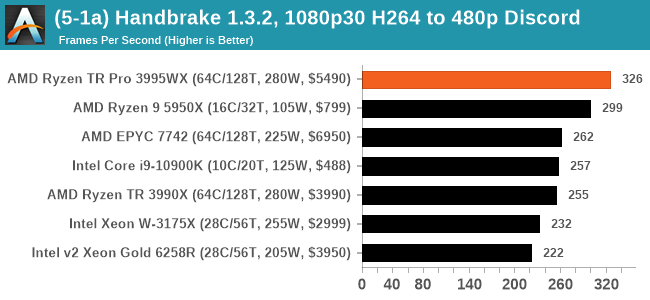
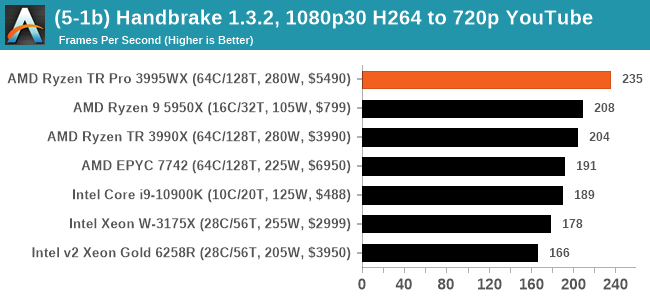
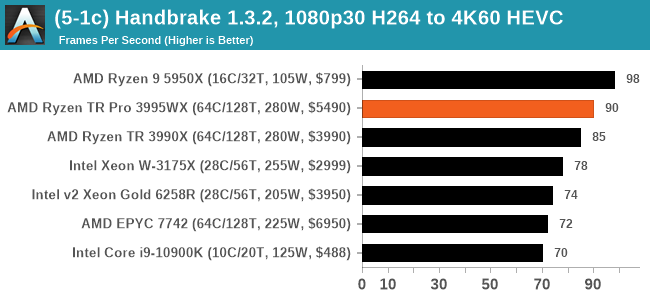
For the lower resolution modes, it would appear that the increased memory bandwidth plays a role for the 3995WX and 7742, although single core frequency also means a lot. Moving to the HEVC metrics, the Ryzen 9 takes a win here, but the 3995WX still goes above the 3990X.
7-Zip 1900: Link
The first compression benchmark tool we use is the open-source 7-zip, which typically offers good scaling across multiple cores. 7-zip is the compression tool most cited by readers as one they would rather see benchmarks on, and the program includes a built-in benchmark tool for both compression and decompression.
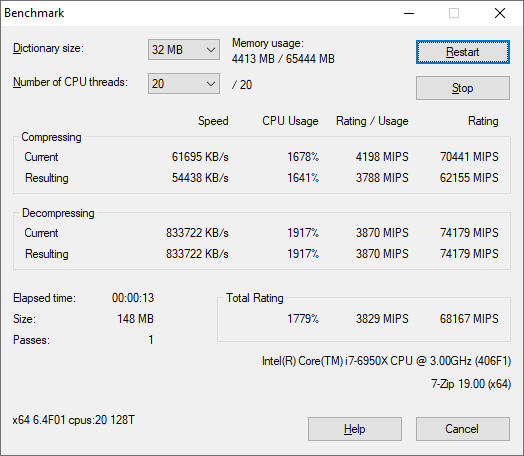
Example Test Run on an Intel 10-core i7-6950X
The tool can either be run from inside the software or through the command line. We take the latter route as it is easier to automate, obtain results, and put through our process. The command line flags available offer an option for repeated runs, and the output provides the average automatically through the console. We direct this output into a text file and regex the required values for compression, decompression, and a combined score.
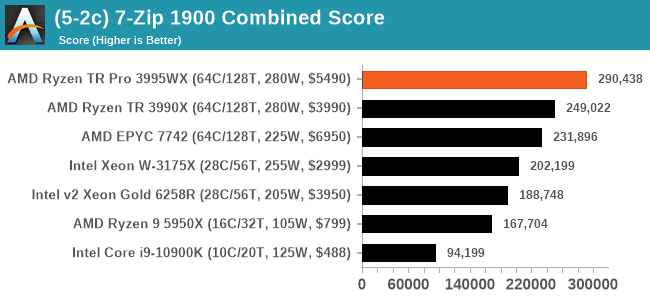
This is a 16.6% win for the TR Pro 3995WX.
AES Encoding
Algorithms using AES coding have spread far and wide as a ubiquitous tool for encryption. Again, this is another CPU limited test, and modern CPUs have special AES pathways to accelerate their performance. We often see scaling in both frequency and cores with this benchmark. We use the latest version of TrueCrypt and run its benchmark mode over 1GB of in-DRAM data. Results shown are the GB/s average of encryption and decryption.
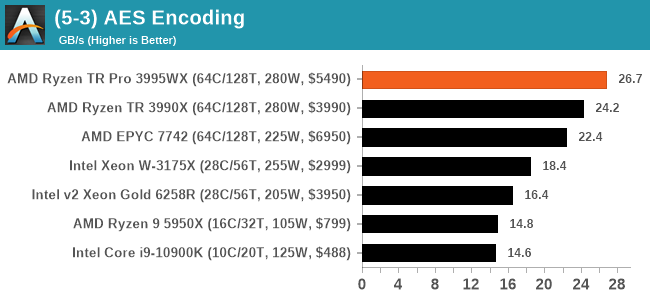
WinRAR 5.90: Link
For the 2020 test suite, we move to the latest version of WinRAR in our compression test. WinRAR in some quarters is more user friendly that 7-Zip, hence its inclusion. Rather than use a benchmark mode as we did with 7-Zip, here we take a set of files representative of a generic stack
- 33 video files , each 30 seconds, in 1.37 GB,
- 2834 smaller website files in 370 folders in 150 MB,
- 100 Beat Saber music tracks and input files, for 451 MB
This is a mixture of compressible and incompressible formats. The results shown are the time taken to encode the file. Due to DRAM caching, we run the test for 20 minutes times and take the average of the last five runs when the benchmark is in a steady state.
For automation, we use AHK’s internal timing tools from initiating the workload until the window closes signifying the end. This means the results are contained within AHK, with an average of the last 5 results being easy enough to calculate.
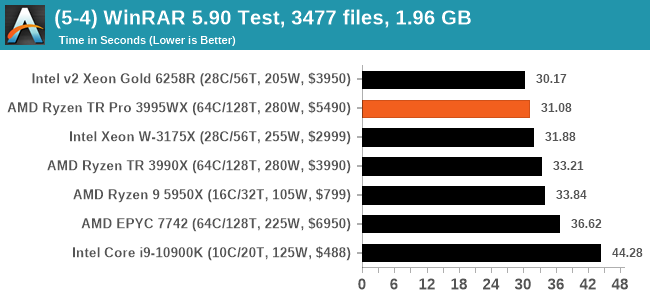
WinRAR is variable threaded, but the Xeon Gold takes the win here - even compared to the Xeon W-3175X. It's all relatively close at the top end.


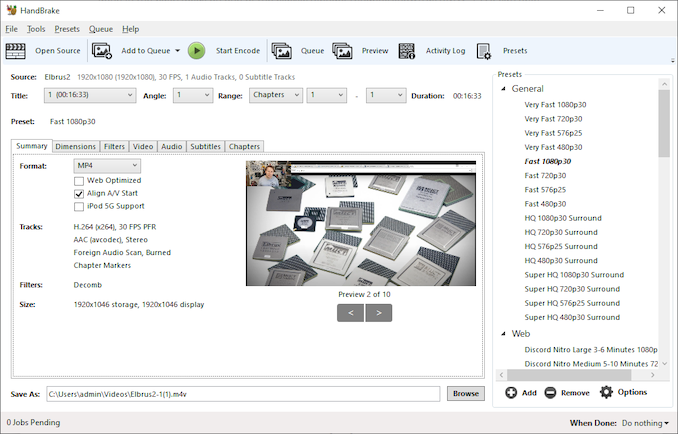
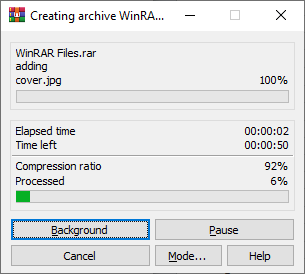








118 Comments
View All Comments
Holliday75 - Friday, February 12, 2021 - link
Oxford Guy: I just want to argue.Spunjji - Thursday, February 11, 2021 - link
They're a professional, they don't care about the name - that was the rebuttal, and it directly addressed your "claim". It doesn't need to be more than their opinion, because your "claim" was just your own turgid opinion.Pseudo-rationalists are a plague.
Oxford Guy - Thursday, February 11, 2021 - link
Another comment that fails to rebut the original claim.grant3 - Friday, February 12, 2021 - link
An industry professional, in the target market for this product, tells you "The name is stellar."Yes, that both addresses + contradicts your claim that you know what inspires "professional confidence" better than the actual professionals.
Spunjji - Thursday, February 11, 2021 - link
p r o f e s s i o n a lSome professionals are gamers. Some have a sense of humour. Some even make games!
But sure, it's not "Xeon", which is "professional" by virtue of being duller than a water flavoured lollipop.
Oxford Guy - Thursday, February 11, 2021 - link
The obsession continues...Qasar - Thursday, February 11, 2021 - link
and its your obsession. nothing wrong with the name threadripper. you want to complain about product names, go look at some names for video cards, or even some motherboards.hmm maybe you dont like the name cause intel didnt make it ?
schujj07 - Thursday, February 11, 2021 - link
Xeon is an even number name than Threadripper of Epyc. The name is too close to Xenon the Nobel gas. If you just heard the name you would think the Intel CPU doesn't play well with anything besides itself.schujj07 - Thursday, February 11, 2021 - link
*dumber not number...stupid autocorrectGeoffreyA - Friday, February 12, 2021 - link
For my part, I think Threadripper is a pretty nice name and have always liked it (it gives the impression of tearing through work with mighty, relentless threading). But I also agree with Oxford Guy's sentiment that names in computing are often made in poor taste (Bulldozer, Netburst, and Core 2 Duo are "choice" specimens). A subjective thing, to be sure, but that's how I feel.